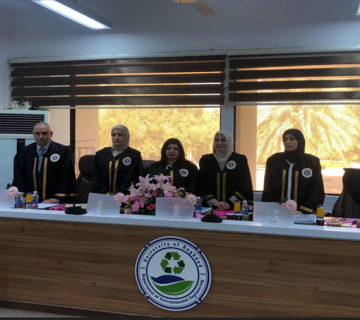The public discussion of the master’s student (Mohammed Kamran Mohammed) from the Department of Civil Engineering on her thesis entitled (Design Assessment and Risk Analysis of Water Supply and Drainage Networks for a Multi-Story Residential Buildings) was held on Tuesday 27/8/2024 in Prof. Dr. Khaled Shaker discussion hall in the Department of Civil Engineering.
The discussion committee consisted of the following respected members:
- Prof. Dr. Faris Hammoodi Al-Ani (Chairman)
- Prof. Dr. Mohammed Sadeq Salman (Member)
- Assist. Prof. Dr.Khalid A. Abdulrazzaq (Member)
- Prof. Dr. Basim Hussein Khudhair (Supervisor)
The (thesis) aimed to :
- Design water supply and drainage networks steps for multi-story residential Building for under construction complex.
- Analysis water supply and drainage networks for different existing buildings.
- Evaluation site networks for existing residential complexes.
- Risk analysis aspect for plumbing design.
Accordingly, the message came out with a set of recommendations, including:
- Calculating the water demand constitutes the most important factor in designing water supply networks inside buildings, ensuring that the demand for water is calculated by adhering to the specifications of the approved codes. A water supply network with high efficiency, low supply, and more economical in implementation.
- The sewage network inside the building have great importance because it works to transfer and remove the waste, dirt and remnants of resident’s daily activities outside the building in a healthy and safe manner. Design a sewage network inside buildings using IPC, 2021 parameters ensures design network with high efficiency, few malfunctions, and the lowest cost.
- Calculating the water consumption is the main factor in designing the external water and sewage networks for residential complexes.
- Risk analysis identifies potential issues in plumbing networks, reducing the likelihood of failures and minimizing maintenance costs.
After the scientific discussion by the gentlemen members of the discussion committee, the researcher received a rating of (Excellent).








